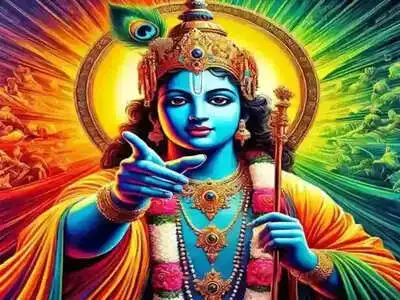We live our lives pretending permanence exists. That this job, this house, this version of “me” is forever. We try not to think about death—not because we don’t believe it’s real, but because we fear what it might mean. That it will erase everything. That it will end everything. But what if that’s just the story we’ve been telling ourselves? The Bhagavad Gita, a text that speaks to the soul without asking you to be religious or philosophical, offers a perspective that is—quietly, powerfully—freeing. It doesn’t deny death. It just refuses to treat it as the full stop we fear it to be.
1. Death Is Not the Opposite of Life
Death is change, not erasure. Soul simply moves on.
Let’s begin here: the Gita doesn’t look at death as life’s enemy. It doesn’t even treat it like a disruption. It sees it as a part of the same process. Like inhaling and exhaling. You don’t grieve an exhale—you know it’s part of breathing. In the Gita, Krishna tells Arjuna that the soul is never born and never dies. It only moves from one body to another. The way we change clothes. The way we move houses.
What we are, essentially, is untouched. It’s a humbling, almost shocking thought. You are more than your body, your story, your mistakes, your wins. You’re something that continues. And if that’s true, then death is not a punishment. It’s movement. It’s change. It’s a doorway.
2. The Soul Is Steady, Even When Life Isn’t
Soul remains unchanged, even as everything else shifts.
The world changes. Bodies age. Minds wander. People leave. We spend years building things that are, by nature, meant to fall apart. But the Gita reminds us that there is something inside us that does not change. Not with time, not with loss, not with death.
That something—call it soul, atman, consciousness—is who we really are. When we identify only with the outer layer of who we are (our name, our role, our achievements), we feel constant anxiety. But when we learn to settle into the inner identity—the one that isn’t shaken by change—we feel a strange, deep peace. The kind you can’t buy or prove. The kind that just is.
3. Rebirth Isn’t Repetition, It’s Opportunity
Rebirth offers growth, not punishment for past mistakes.
People often misunderstand the idea of rebirth as some kind of punishment: a never-ending cycle you can’t get out of. But the Gita sees it as something else. As a kind of grace. You’re not given another life because you failed this one.
You’re given another life because the soul is still learning, still unfolding, still longing to return to its purest self. You’re not trapped in a cycle. You’re evolving through it. And if that’s true—then every experience, even the painful ones, is a step forward. You’re not stuck. You’re growing.
4. Karma Isn’t a Threat. It’s a Mirror
Karma reflects choices, guiding your soul’s next direction.
Karma has been reduced in popular culture to a kind of cosmic revenge system: “What goes around comes around.” But the Gita doesn’t say karma is there to punish. It says karma is there to reflect. The life you live becomes the mirror you see yourself in next. Not out of cruelty—but out of continuity. We are given the consequences of our choices—not because life is trying to trap us—but because it’s trying to teach us.
What we put into the world matters. Not because we’ll get punished if we don’t—but because we’ll have to meet that energy again. In some form. In some way. Karma is not about blame. It’s about responsibility. You get to shape your path. Even now. Especially now.
5. The Fear of Death Comes From Forgetting Who You Are
Fear fades when you remember your eternal nature.
What if the fear of death isn’t really about dying—but about not having lived with meaning? About being too attached to things that were never ours to keep? The Gita’s ultimate message is not about death. It’s about identity.
You are not this moment of pain. You are not your title. You are not your fear. You are something that was never born and can never die. You are something watching it all, walking through it all, learning to let go.
